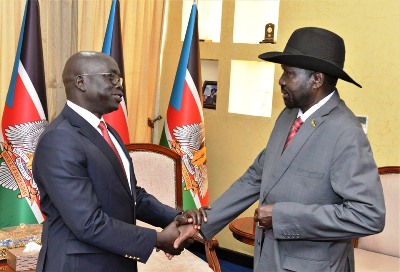South Sudan’s Kiir briefed on devastating flood situation
October 28, 2019 (JUBA) – South Sudan’s Humanitarian Affairs and Disaster Management minister, Hussein Maar Nyuot on Monday briefed President Salva Kiir on the flood situation across the country.

He assured the population affected by the devastating floods to be calm, saying government is working hard to control the situation.
Nearly a million people in South Sudan have been affected by heavy flooding, the United Nations Office for Coordination for Humanitarian Affairs (OCHA) said Friday.
Severe floods, it said, have devastated large areas of the country since July, submerging entire communities and forced hundreds of thousands from their homes.
An estimated 908,000 people have reportedly been affected, including internally displaced people, refugees and their host communities in a country already hit by years of ruinous civil war that caused mass displacement and wrecked its economy.
Alain Noudeho, OCHA humanitarian coordinator in South Sudan, said the situation is “extremely” concerning as rains are likely to continue for another four to six weeks and put more people at risk.
Floods have also limited access to health facilities, nutrition centres, basic services and markets, the agency said.
Across the 32 flooded counties in South Sudan’s Jonglei, Upper Nile, Warrap, Eastern Equatoria, Northern Bahr el Ghazal, Unity and Lakes region, over three million people were already in need of humanitarian assistance even before the rains, according to OCHA.
Many affected areas, it said, were already facing high humanitarian needs before the flooding started, with more than 60 per cent of them classified as having extreme levels of acute malnutrition.
(ST)
